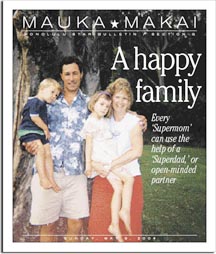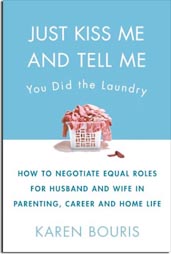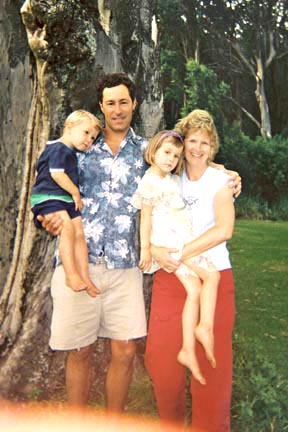
[ MAUKA MAKAI ]
How to truly
have it allAn author says traditional gender
roles are obstacles to negotiating
household duties
These days, little girls grow up with the message that they can become doctors, lawyers or hold other lofty positions. But once motherhood enters the picture, the whole equation changes.
New mothers may find that in order to "have it all," they need to "do it all." For many, Supermom is their new role as they perform a juggling act in order to manage a full-time job, household chores, changing diapers and chauffeuring the kids to their various activities.
Don't despair, said Karen Bouris, the Maui-based author of "Kiss Me and Tell Me You Did the Laundry: How to Negotiate Equal Roles for Husband and Wife in Parenting, Career and Home Life." There are ways to work out schedules that benefit the entire family.
"Kiss Me and Tell Me You Did the Laundry:
How to Negotiate Equal Roles for Husband
and Wife in Parenting, Career and Home Life,"
by Karen Bouris
(Rodale, 288 pages, $14.95)
While Bouris is not a psychologist, she understands firsthand what she writes of -- she is a working mom. And she interviewed close to 75 parents for the book.
"We need to redefine what it means to be a good parent," she said. "Mom doesn't need to bake good cookies, and dads don't need to make all of the money for their family as traditional roles dictate, she said, explaining that traditional gender roles are outdated as they represent "a major imbalance of power."
If 50 percent of marriages are ending in divorce, she figures, we must be doing something wrong in following traditional gender roles.
Many stay-at-home moms, in spite of relishing time spent with their kids, often feel guilty because they miss their careers and activities outside the family. Men may resent the long work hours that minimize family time, but fear relinquishment of their role as primary breadwinner, she said. As a result, neither feels fulfilled.
Bouris' guide redefines parenting roles and offers a plan to help couples create strong partnerships and enhance loving relationships.
Equal parenting does not necessarily constitute a 50-50 division of duties. Partners would be best served by choosing parenting roles through mutual agreement, she added.
BOURIS' BOOK was borne out of her childhood. She had grown up living with her dad.
"I knew that fathers could be excellent nurturers and could indeed multitask," she said. "My father made my school lunch every day, worked in an office and then had dinner on the table at night. I just assumed that these tasks could be done by either a father or a mother.
"My mother had been a stay-at-home mom and had little self-esteem. When my parents divorced, she didn't have the inner strength to know that she could be self-sufficient and have love left over for her family. The book supports both men and women developing their emotional and family lives and their working lives."
Women must value the work they do as equal to their partners, even if they are stay-at-home moms, Bouris said. Although they don't receive a paycheck, they do work hard.
"Women can be their own worst critics. We often feel guilty about our own choices as mothers, whether we work too much, not enough, put our child in child care, have a child that struggles in school or is an overachiever," she said. "It infuriates me. ... There is never any discussion on men and their career choices. People blame everything on the mom."
When women have deep conversations with each other, they are really supportive, she added. Shared common ground is the powerful connection mothers have with one another. "They realize that nobody has it easy. We all have the same goal: to love and care for our children to the best of our ability."
Author Karen Bouris and her husband, Gill Newton, have sacrificed work hours for more time spent with their children and each other.
BOURIS and her husband, Gill Newton, worked out their own alternative parenting schedule for their 5-year-old daughter and 2-year-old son. "I work full time (she's publisher at Inner Ocean Publishing) and Gill works part time," she said. "Gill used to work about 70 hours (a week), and I worked 25."
Their combined working hours now number 55 instead of 95. "It leaves us more time for the children, our relationship and each other. When you reverse roles, you have the privilege of walking in each other's shoes and get a real understanding for the ups and downs of both parenting and working."
As a result of the change, their children have a much stronger bond with their father. "It shows the children that their father loves them enough to make compromises and spend time with them," Bouris said.
"My husband has an amazing awareness of everything from the monotony of packing a healthy lunch every day to newfound concern for teachers' salaries because he now has relationships with the children's teachers. And I have an understanding of the pressures of working outside of the home.
"It's still hard sometimes," she said. "I am missing things, but my husband is experiencing them. We share the joy as well as the work of parenting."
Once Newton let go of the habitual commitment to work, the experience became thoroughly positive.
He says he would not have it any other way now. "Spending more time with the children is all-consuming. You become much more attached than you ever thought you could be. Everything else going on in your life suddenly seems irrelevant."
While some people might find the nontraditional roles peculiar, he doesn't seem to mind. "It's kind of strange, but I will never regret it. I've made a conscious decision to spend more time with my kids."
When the children receive love from both of their parents, they feel more secure, he added.
In order to maintain a healthy balance for everyone, roles are always "in flux," he said.
"Like most couples, we are still a work in progress ... but we are definitely happy about the prioritizing of our children and our quality of life over working constantly," Bouris said.
Couples are happier when they have more of a partnership, she said. "And, children really benefit from a happy marriage."
It's important to set a good example because relationship expectations are set while children are growing up. They learn by example, Newton said.
Bouris says couples need to find what works best for them. "This might be that both parents work part time, or it might mean having a breadwinner/stay-at-home parent partnership for a few years." Most important, roles should be chosen with intention, not by default.
Bouris added, "It's important to make sure that the mother isn't permanently sacrificing her own goals, dreams and self-esteem ... and to ensure that the father isn't pressured to be the sole breadwinner at the expense of having a close relationship with his family. Having children does mean compromises and sacrifices, by both parents."
On the cover: Maui couple Karen Bouris and Gill Newton have shared roles, sometimes unconventional, in raising their children Matthew, 2, and Ella, 4.
Click for online
calendars and events.




